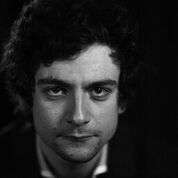|
Back
Dazzling Stravinsky a highlight Calgary
Jack Singer Concert Hall
09/04/2015 - & September 7*, 2015
September 4, 2015: Solo Recital
Frédéric Chopin: Sonata No. 2 in B-flat minor, Op. 35 – Nocturnes in C-sharp minor Op. 27 No. 1 & in F minor Op. 55 No. 1 – Ballade No. 4 in F minor Op. 52
Igor Stravinsky: Trois mouvements de Pétrouchka
September 7, 2015: Collaborative Recital
Franz Liszt: Die drei Zigeuner S. 320
Piotr Ilyich Tchaikovsky: Romance "Den' li tsarit?" Op. 47 No. 6
Johannes Brahms: Sonata for clarinet in F minor Op. 120 No. 1 – Geistliches Wiegenlied Op. 91 No. 2
Dmitri Shostakovich/Lena Auerbach: from 24 Preludes for piano Op. 34: Nos. 10, 14, 15, 16, 19 & 24
Jean Françaix: Trio for clarinet, viola and piano
Isabel Bayrakdarian (soprano), James Campbell (clarinet), Hsin-Yun Huang (viola), Alexander Ullman (piano)

A. Ullman (© Chris Krieger)
British pianist Alexander Ullman, age 24, has studied in his own country plus the USA (Curtis Institute) and in Italy. He won the top prize in the Franz Liszt Piano Competition in Budapest in 2011, and was one of the 36 pianists to participate in Moscow’s Tchaikovsky Competition this past June.
He opened with the Chopin Sonata No. 2 in B-flat minor, the one with the famous funeral march in the third movement. The second movement - Scherzo - seemed a bit scrambled, but the other fast movement, the finale (Presto) was very light and fleet. The Opus 27 Nocturne was well-structured, the Opus 55 Nocturne had a languorous feel. The Ballade was intimate, conversational.
Four of the ten pianists featured Chopin in their solo recitals (the others were Henry Kramer, Sejoon Park, and Karim Said), and Ullman’s measured up well, but he really thrilled the audience with the Three Movements from Petrushka that Stravinsky composed (in 1921) for Arthur Rubinstein to show off the pianist’s amazing technique. It calls for stunning contrasts for both hands at the same time while it conjures up a vivid picture of the colourful work. It is understandably not often programmed - and it was a real treat to hear it played so superbly.
His encore was Chopin’s Nocturne in E-flat major Op. 55 No. 2 in a performance that emphasized the contrapuntal nature of the piece.
In his collaborative recital three days later he brought lots of Hungarian flavour to the dashing introduction to the Liszt song, and understated warmth to the Tchaikovsky song. The Brahms sonata went very well, and in the Shostakovich preludes he contributed to a well-defined mood for each piece, especially the 15th and the melancholic 19th.
In the Françaix work, he contributed notable acuteness to the circusy second movement (marked Allegrissimo) and fourth (Largo) in which the other two instruments ostensibly have the lead.
Mr. Ullman was definitely a contender, but was not one of the finalists. His classical concerto would have been Mozart’s 21st, and his post-classical work Tchaikovsky’s Piano Concerto No. 1.
ABOUT THE HONENS
The Honens International Piano Competition, named for its founding donor, held its first competition in Calgary in 1992. It is open to pianists between the ages of 20 and 30 who have no professional representation, and offers the richest prize of any of the world's many such competitions: a $100,000 first prize which comes with a three-year artist development program worth $500,000. The 2015 competition was the eighth.
The main objective of the competition is to discover “the complete pianist”, and here is the procedure: Earlier this year, interested pianists applied online, submitting information on their training and experience in performances and competitions. The Applicant Screening Jury selected 50 to participate in the quarterfinals, which consisted of 40-minute recitals (with audience) filmed in Los Angeles, New York or Berlin. Each pianist also made a taped 10-minute interview. These fifty recordings and the interviews were examined by a jury of four (Canadian pianist Stewart Goodyear, Israeli pianist Inon Barnatan, Japanese pianist Noriko Ogawa, and Mary Sigmond, president of a piano recital series in Minnesota).
Ten of the 50 were selected to come to Calgary for the semifinals (running for five days beginning Sept 3), during which each one performed a 65-minute solo recital (entirely different from the earlier 40-minute recital), and a 65-minute collaborative recital accompanying soprano Isabel Bayrakdarian, violist Hsin-Yun Huang, and clarinetist James Campbell. (Each pianist chose one of three programs for these collaborative recitals.) Each pianist had a two and one-half hour session with the collaborators, plus a dress rehearsal.
After the semifinal round, three pianists were chosen for the two final concerts with the Calgary Philharmonic Orchestra under Yan Pascal Tortelier. For the first concert they each chose a concerto from a list of classical era works, and for the second concert they played a work of their own choosing from the post-classical era. The jury for the semifinal and final rounds consisted of three pianists (Alessandra Ammara, Janina Fialkowska, and Pedja Muzijevic ) and four arts managers: Paul Hughes (General Manager of the BBC Symphony Orchestra), Jeremy Geffen (Director of Artistic Planning for Carnegie Hall), Charles Hamlen (a founder of IMG Artists), and Costa Pilavachi (Senior Vice President of Classical Artists and Repertoire for Universal Music Group).
The jury assigned scores to each segment of the process, with each of the solo and collaborative recitals worth 30% of the final score, and each of the two concerto performances worth 15%. Ten percent of the final score was based on a 15-minute interview (taped) with an arts journalist.
The next competition will be in 2018.
Complete information on Honens can be found on the website.
Michael Johnson
|